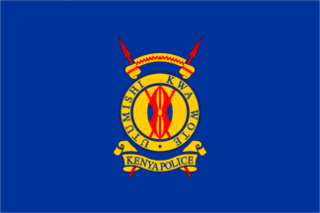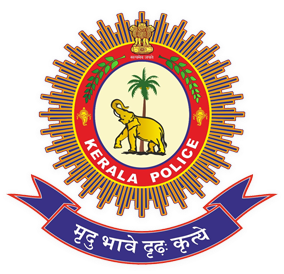
The Metropolitan Police Service (MPS), formerly known as the Metropolitan Police, which is still its common name, serves as the territorial police force responsible for law enforcement and crime prevention within Greater London. In addition, it is responsible for specialised tasks throughout the United Kingdom, such as dealing with counter-terrorism throughout the UK, and the protection of certain individuals, including the monarch, royal family, governmental officials, and other designated figures. Commonly referred to as the Met, it is also referred to as Scotland Yard or the Yard, after the location of its original headquarters in Great Scotland Yard, Whitehall in the 19th century. The Met is presently headquartered at New Scotland Yard, on the Victoria Embankment.

The Garda Síochána is the national police and security service of Ireland. It is more commonly referred to as the Gardaí or "the Guards". The service is headed by the Garda Commissioner, who is appointed by the Irish Government. Its headquarters are in Dublin's Phoenix Park.

Law enforcement in India is imperative to keep justice and order in the nation. Indian law is enforced by a number of agencies. Unlike many federal nations, the constitution of India delegates the maintenance of law and order primarily to the states and territories.
A police commissioner is the head of a police department, responsible for overseeing its operations and ensuring the effective enforcement of laws and maintenance of public order. They develop and implement policies, manage budgets, and coordinate with other law enforcement agencies and community groups. Additionally, the commissioner handles high-profile cases, addresses public concerns, and represents the department in various forums.

The Zimbabwe Republic Police (ZRP) is the national police force of Zimbabwe, having succeeded the British South Africa Police on 1 August 1980.

Tamil Nadu Police is the primary law enforcement agency of the state of Tamil Nadu, India. It is over 150 years old and is the fifth largest state police force in India. Tamil Nadu has a police-population ratio of 1:632. The Director General of the Tamil Nadu police is Shankar Jiwal.

The Kenya Police Service is a national body in charge of law enforcement in Kenya. It is subordinate to National Police Service which is headed by Inspector General of Police who exercises independent command over the Service. Kenya Police is headed by Deputy Inspector General. Kenya Police is divided into Service Headquarters in Nairobi, Formations, General Duty Commands and Training Institutions.

The Ghana Police Service is the main law enforcement agency in Ghana. It is organized at national level and has a unitary command under the Inspector General of Police (IGP). Although there are many regional and divisional commands, they all report to the National Headquarters in Accra.

Law enforcement in Ethiopia is dealt with by the Ethiopian Federal Police at federal level and by regional police commissions in the Regions of Ethiopia. The Ethiopian Federal Police (EFP) was established in 1995 to serve the public, to ensure the observation of human and democratic rights and to maintain the safety and welfare of the public. Its stated duties are the enforcement of laws and safeguarding constitutional guarantees, the prevention, detection and investigation of crime, the coordination of national state police commissions and development of national policing standards. The EFP also has to provide operational support to regional police commissions.
However, local militias also provide local security largely independent of the police and the Ethiopian military. Corruption is a perennial problem, particularly among traffic police who solicited bribes.
The U.S. Department of State states that its contacts within the Ethiopian government report that the findings of investigations into abuses by local security forces, such as arbitrary detentions and beatings of civilians, are rarely made public. However, the Ethiopian government continued its efforts to train police and army recruits in human rights. During 2008 the government was seeking assistance from the International Committee of the Red Cross, the local non-governmental organization Prison Fellowship Ethiopia (JFA-PFE), and the Ethiopian Human Rights Commission to improve and professionalize its human rights training and curriculum. The JFA-PFE provided human rights training for police commissioners and members of the militia in 2008.

The International Criminal Police Organization – INTERPOL, commonly known as Interpol, is an international organization that facilitates worldwide police cooperation and crime control. It is the world's largest international police organization. It is headquartered in Lyon, France, with seven regional bureaus worldwide, and a National Central Bureau in all 196 member states.

The Uttar Pradesh Police, is the primary law enforcement agency within the Uttar Pradesh state of India. Established in 1863 as the Office of the Inspector General of Police, United Provinces under the Police Act, 1861.

The Sierra Leone Police (SLP) is the national police force of the Republic of Sierra Leone. It is primarily responsible for law enforcement and crime investigation throughout Sierra Leone. The Sierra Leone Police is under the jurisdiction of the Sierra Leone Ministry of Internal Affairs, a cabinet ministry in the Government of Sierra Leone.

The Nigeria Police Force is the principal law enforcement and the lead security agency in Nigeria. It was designated by the 1999 constitution as the national police of Nigeria, with exclusive jurisdiction throughout the country. As at 2021, it had a staff strength of about 371,800. There are currently plans to increase the force to 650,000, adding 280,000 new recruits to the existing 370,000. The Nigeria Police Force is a very large organisation consisting of 36 State commands and Federal Capital Territory (FCT) grouped into 17 zones and 8 administrative organs. As at July 2024, the NPF is headed by IGP Kayode Egbetokun. In 2020, it underwent major overhauls.
An inspector-general of police is a senior police officer in the police force or police service of several nations. The rank usually refers to the head of a large regional command within a police service, and in many countries refers to the most senior officer of the entire national police.

The Ghana Police Service (GPS) is the main law enforcement agency of Ghana. The service is under the control of the Ghanaian Ministry of the Interior, and employs over 30,000 officers across its 651 stations.

The Namibian Police Force (NAMPOL) is the national police force of Namibia. It was established by the Namibian Constitution and enacted by an act of Parliament. The Namibian Police Force replaced the South West African Police as the national police force of the country in 1990. Sebastian Ndeitunga was its inspector general since 2005 to 2022. Joseph Shikongo is the current inspector general. NAMPOL's functions are overseen by the Ministry of Home Affairs, Immigration, Safety and Security.

Stephen Lo Wai-chung is a Hong Kong retired law enforcement administrator. Lo joined the Hong Kong Police Force in 1984 after his graduation from the University of Hong Kong with a bachelor of social science in management. He served as the Commissioner of Police of Hong Kong from 2015 to 2019, Deputy Commissioner of Police (Management) from 2014 to 2015, Deputy Commissioner of Police (Operations) from 2013 to 2014, and Senior Assistant Commissioner of Police from 2011 to 2013.

The Kerala Police is the law enforcement agency for the Indian state of Kerala. Kerala Police has its headquarters in Thiruvananthapuram, the state capital. The motto of the force is "Mridhu Bhave Dhrida Kruthye" which means "Soft in Temperament, Firm in Action" in Sanskrit. It operates under the Department of Home Affairs, Government of Kerala. The force is headed by the State Police Chief, and the incumbent chief is Shaikh Darvesh Sahib, IPS.
The Malawi Prison Service is a Malawian government agency responsible for the administration and management of prisons in Malawi.


















